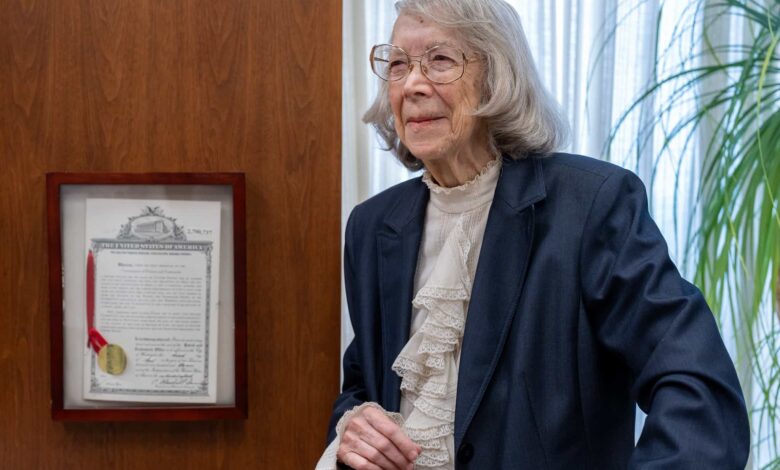Federal Circuit Judge Pauline Newman

The landscape of American jurisprudence, particularly in the realm of intellectual property law, has been profoundly shaped by the contributions of Federal Circuit Judge Pauline Newman. Her illustrious career, spanning several decades, marks a journey of exceptional legal scholarship, unwavering commitment to the principles of justice, and a pioneering spirit that broke through many glass ceilings. This article delves into the life and career of Judge Newman, exploring her significant impact on the legal world and the Federal Circuit in particular.
Early Life and Path to the Bench
Born in 1927, Judge Pauline Newman’s early life set the stage for her remarkable career. She grew up in a time when opportunities for women in the legal profession were scarce. Despite these challenges, Newman pursued her academic interests with vigor. She earned a bachelor’s degree in chemistry from Vassar College and later a master’s degree in pure science from Columbia University. Her foray into the legal realm began with a law degree from New York University School of Law, where she excelled and laid the groundwork for her future legal achievements.
Before her appointment to the bench, Newman had a diverse professional background. She worked as a research scientist, patent attorney, and eventually became the first woman to serve as Director of Patent, Trademark, and Licensing at FMC Corporation. Her multifaceted experience in both science and law provided her with a unique perspective that would later become invaluable in her judicial decisions.
Appointment to the Federal Circuit
In 1984, Judge Newman was appointed by President Ronald Reagan to the United States Court of Appeals for the Federal Circuit, a relatively new court at the time, established in 1982. This court specializes in complex areas of law including patent, international trade, government contracts, and veterans’ benefits. Newman’s appointment was a significant milestone; she was not only one of the first women to serve on this court but also brought an unparalleled expertise in patent law.
Her appointment came at a critical time when the American legal landscape was grappling with burgeoning issues in technology and intellectual property. Newman’s deep understanding of both science and law made her an ideal fit for the court. Throughout her tenure, she has been instrumental in shaping the jurisprudence of the Federal Circuit, particularly in patent law.
Impact on Intellectual Property Law
Judge Newman’s influence in the realm of intellectual property (IP) law has been monumental. She is known for her detailed and thoughtful opinions, which often reflect a deep understanding of the underlying scientific principles. Her decisions have consistently underscored the importance of strong patent protections as a means of fostering innovation and economic growth.
One of her notable contributions is her stance on patent eligibility. Newman has often advocated for a broader interpretation of what constitutes patentable subject matter, arguing that restrictive views can stifle innovation. Her opinions in key cases have clarified and expanded the boundaries of patent law, influencing how patents are granted and litigated in the United States.
Furthermore, Judge Newman has been a vocal advocate for harmonizing international patent laws. Recognizing the global nature of commerce and innovation, she has argued for more consistent patent standards across international borders, which would benefit inventors and businesses alike.
Champion of Equity and Justice
Beyond her technical contributions, Judge Newman is also celebrated for her commitment to fairness and equity in the legal system. She has been a strong voice in promoting diversity in the legal profession and has mentored countless young lawyers, particularly women and minorities, encouraging them to pursue careers in law and intellectual property.
Her rulings often reflect a balanced approach, considering not only the letter of the law but also its impact on individuals and society. This humanistic perspective has earned her respect and admiration from peers and practitioners alike.
Legacy and Influence
As of 2024, Judge Newman’s legacy in the Federal Circuit and the broader legal community is well-established. Her prolific body of work continues to be a reference point for lawyers, judges, and scholars. She has contributed significantly to the jurisprudence of the Federal Circuit, setting precedents that have shaped the interpretation and application of IP law in the United States.
Her role as a trailblazer for women in the legal profession cannot be overstated. Her career serves as an inspiration, demonstrating that with skill, determination, and a commitment to justice, barriers can be broken and significant contributions made to the legal field.
Conclusion: A Lasting Impact
In summary, Federal Circuit Judge Pauline Newman’s career is a testament to excellence in the legal profession. Her deep understanding of both the technical and legal aspects of intellectual property law has made her a pivotal figure in shaping this field. Her dedication to equity and justice, combined with her mentorship of the next generation of lawyers, ensures that her influence will endure long into the future. As she continues to serve on the bench, her decisions and insights remain as relevant and impactful as ever, cementing her legacy as a legal luminary and a champion of intellectual property law.



